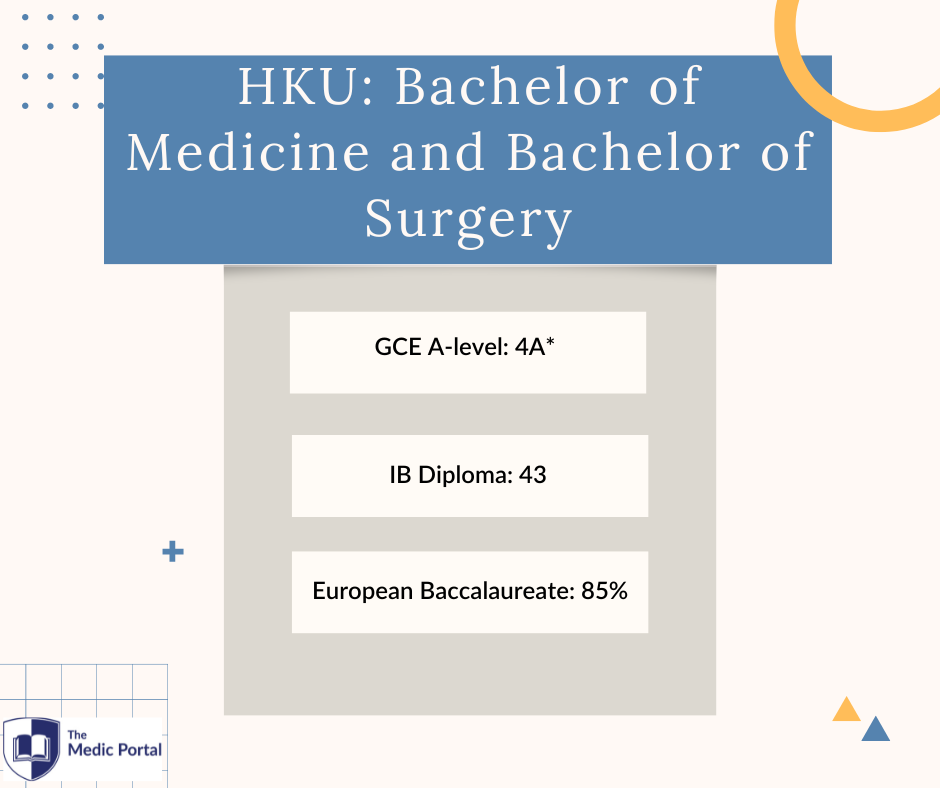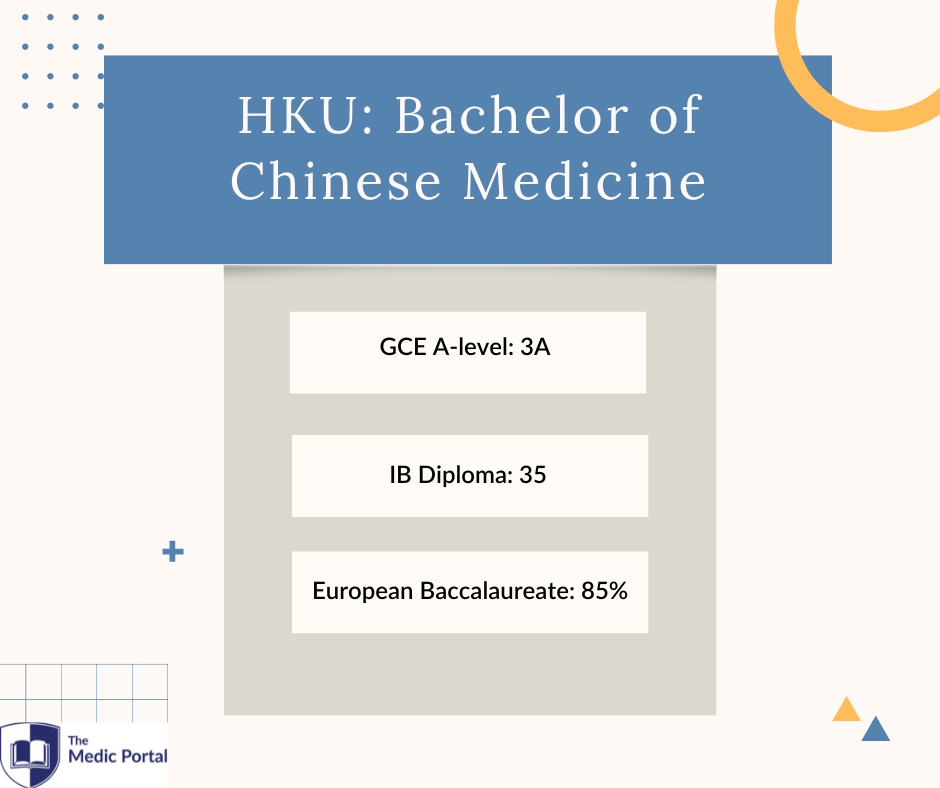About HKU
If you’re thinking of studying Medicine in Hong Kong, the Li Ka Shing Faculty at the University of Hong Kong (HKU) is an excellent school to consider.
In 2010-11, the Faculty was ranked number one in Asia for ‘Clinical, Pre-Clinical and Health Universities’ in the Times Higher Education’s World University Rankings. It also occuppied the 31st position in the Quacquarelli Symonds (QS) World University Rankings by Subject in 2023 in Medicine.
Li Ka Shing is also the oldest medical faculty in the city. It was founded in 1887 as a western medical college, and in 1911 opened as a medical faculty. Comprised of fourteen departments, it offers a range of courses in Medicine, Dentistry, and Nursing.
HKU Medicine: What Can I Study?
There is a range of different Undergraduate course programmes offered at the Li Ka Shing Faculty of Medicine:
- Bachelor of Medicine and Bachelor of Surgery (MBBS) (6 years/5 years)
- Bachelor of Nursing (BNurs) (4 years/5 years)
- Bachelor of Chinese Medicine (BChinMed) (5 years/6 years)
- Bachelor of Pharmacy (BPharm) (3 years/4 years)
- Bachelor of Arts and Sciences in Global Health and Development (4 years)
- Bachelor of Science in Bioinformatics (4 years)
You can choose based on individual programmes’ course structures and admission criteria.
What Are the Entry Requirements?
Each course at HKU has different entry requirements – so double check these before applying! Below are some Medicine course requirements examples.



A good working knowledge of Cantonese is also required for HKU’s courses. In addition, you must also attain a Level 3 in two electives, one of which must be Chemistry or Combined Science, with Chemistry as one of the components.
It’s worth noting here that Mathematics Extended Modules are not considered as an elective subject. The 4A* requirements are excluding Chinese and English language subjects, Critical Thinking, General Studies, Global Perspectives and Research, Knowledge and Enquiry, Project Work, Thinking Skills, and Extended Project Qualification.
Make sure you check which subjects will or will not be considered for your course!
How Do I Apply?
Once you’ve decided which courses and universities you’d like to apply to, the next step is completing your application. The application process for HKU Medicine is completed through the Joint University Programmes Admissions System (JUPAS). This is started, usually in September, via the following method:
- Create a personal online application – create your online account with JUPAS.
- Complete the online application – this form should include your personal profile and confirmed programme choices – make sure you check the entry requirements of all schools before applying!
- Payment of your application fee – at this stage, you will need to pay your non-refundable HK$460 fee (or HK$810 for late applications). Your application for HKU Medicine will not be sent until you have paid this – the JUPAS deadline is usually around December, so make sure you have completed your application before then.
After this, your application to HKU Medicine is complete – good luck!
How Will I Be Interviewed?
The first round of interviews for HKU Medicine will be held in June. In July, HKDSE results will be announced, and there’ll be a second round of interviews afterwards. Offers will be made to successful students in August. The interviews themselves will be conducted in a group setting in both English and Chinese.
HKU Medicine: What’s An Enrichment Year?
The new medical “130” curriculum at the University of Hong Kong (HKU) — aptly named to celebrate the faculty’s 130th anniversary — features an Enrichment Year during the third year of study of the six-year programme, between the preclinical and clinical years of study.
As the term “enrich” suggests, this year allows students to take a break from their traditional medical studies to explore specific areas of interest, enhancing their overall learning experience and furthering personal development.
This sounds intriguing, but what can you actually do? Opportunities are largely split into three themes:
- Service/humanitarian work: working with local or international organisations as volunteers to serve those in need
- Intercalation/exchange: pursuing an intercalated Bachelor’s or Master’s degree (usually in the UK) or going on exchange
- Research: attaching to a professor to help with their research
These plans do not necessarily have to be medically-related: if you decide to study abroad, you could take courses in philosophy and physics— the possibilities are endless. The point of this programme is to explore a passion – or passions – and to develop skills and qualities that may not otherwise be developed in such a specialised field of study like Medicine.
HKU partners with external organisations and institutions to offer customised programmes to students. For example, the school has teamed up with the University of Bristol and the University of Glasgow to offer intercalated Bachelor’s degrees in fields ranging from Neuroscience to Medical Humanities.
HKU itself offers Master in Public Health (MPH) and Master of Research in Medicine (MRes[Med]) programmes for intercalation. Of course, those who have something specific in mind that they would like to pursue are encouraged to initiate their own proposals.
How Much Will It Cost?
Tuition fees at the University of Hong Kong will be HK$42,100 (£4,251) per year. HKU estimate that the cost of accommodation in Hong Kong per year is around HK$14,000 – $28,000, and living expenses total up to HK$50,000 (roughly, £5048).
The good news is that there are plenty of scholarships and funding available to study in Hong Kong. Grants and loans from the Tertiary Student Finance Scheme are available to full-time local students from economically deprived backgrounds at UGC or publicly funded universities, like HKU.
There is also a Non-Means-Tested Loan Scheme for Full-time Tertiary Students, which provides loans for full-time local students up to the amount of the university’s tuition fees.
Applying For HKU Medicine: Tips
Your essential application tips!
- Thoroughly understand the specific requirements and criteria set by HKU Medicine
- Showcase a strong academic record, particularly in relevant subjects such as biology, chemistry, and physics
- HKU Medicine values personal attributes and qualities. Highlight your passion for medicine
- Attend information sessions or open days organized by HKU Medicine
- Be prepared for interviews and aim to achieve your predicted results
HKU Medicine: FAQs
Is HKU good for Medicine?
HKU was the 31st school in the world for Medicine according to the Quacquarelli Symonds (QS) World University Rankings by Subject in 2023 and 1st in Hong Kong. It’s Hong Kong’s oldest and most prestigious faculty of medicine, so you would be in good hands to kickstart your future career as a doctor there!
What is the acceptance rate for HKU Medicine?
The acceptance rate at HKU for Medicine courses is estimated between 10%-17%. Note that the process is very competitive: for example, for Bachelor of Medicine and Bachelor of Surgery, applicants are required to have a minimum of 4A*.
Is HKU Medicine taught in English?
University of Hong Kong (HKU) teaches in English, although a good working knowledge of Cantonese is often required during the application process.
Does HKU accept A levels?
Yes, applicants should provide a proof of achievement in an international examination, such as an IB Diploma, GCE A Level, SAT / ACT / AP, etc.
Is HKU or NUS better?
HKU (the University of Hong Kong) and NUS (the National University of Singapore) are two top universities in Asia that are closely matched in various aspects. While NUS holds a slightly stronger reputation among academics and employers (2nd and 4th respectively) HKU follows closely (6th and 11th respectively).
Both universities rank well in terms of faculty/student ratio, indicating a good level of academic support. Additionally, both institutions have been extremely successful in attracting overseas students and academics, offering thriving exchange programs and fostering diverse communities.
Both HKU and NUS are excellent choices, and the decision between them may depend on individual preferences and specific academic interests.
